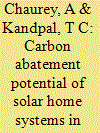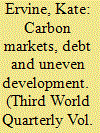| Srl | Item |
| 1 |
ID:
088032


|
|
|
|
|
| Publication |
2009.
|
| Summary/Abstract |
About 78 million rural households in India reportedly lack access to grid electricity. About 67 million of them use kerosene for lighting. Government of India is promoting the use of solar home systems (SHS) as one of the options for meeting lighting requirements in households in remote and less inhabited villages. About 363,399 SHS were reportedly disseminated across the country by December 2007. Apart from meeting the basic lighting need of the households, SHS also help in abating the emissions of green house gases (GHGs) by directly displacing the use of kerosene in households that currently use it for lighting. This study has attempted at estimating the CO2 mitigation potential of SHS in India by studying the potential for their diffusion and the appropriate baseline. Subsequently, the scope for cost reduction to the user due to carbon finance, if received, is also studied. It is found that carbon finance could reduce the effective burden of SHS to the user by 19% if carbon prices were $10/tCO2 and no transaction costs were involved in getting the carbon revenues. These benefits are also estimated for scenarios where transaction costs are incurred by the project proponent in getting the carbon benefits.
|
|
|
|
|
|
|
|
|
|
|
|
|
|
|
|
| 2 |
ID:
121781


|
|
|
|
|
| Publication |
2013.
|
| Summary/Abstract |
The United Nations Clean Development Mechanism (cdm) has been envisaged as a powerful tool for reconciling the global South's environment and development problematic. By allowing Southern states to produce and sell carbon credits into the Kyoto Protocol's compliance market, many predicted a growing North-South transfer of carbon finance, technology and profit. Confronted by deep crisis in global carbon markets, however, the cdm, rather than spurring development, is furnishing the conditions for rising debt and insecurity since project costs must be financed upfront, with the expectation that future project revenue will subsequently fulfil these obligations. This paper analyses the dialectic entanglements between the cdm's ex post and market-dependent financing structure, the carbon market crisis and uneven development, based on the contention that cdm-related debt reveals the deeply unequal power relations that underpin contemporary approaches to climate change mitigation, whereby the North's ecological debt is displaced, both materially and financially, onto Southern actors.
|
|
|
|
|
|
|
|
|
|
|
|
|
|
|
|